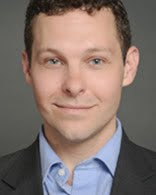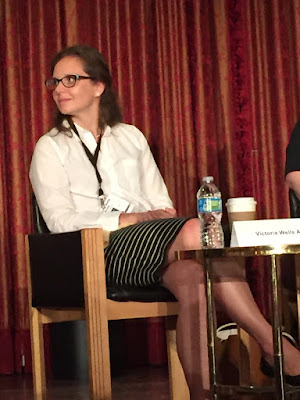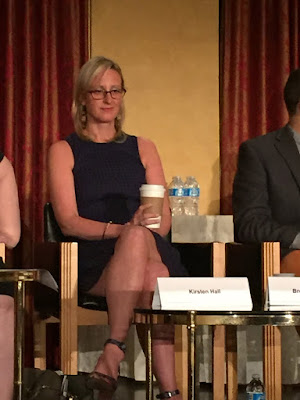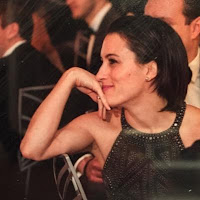 Erica Rand Silverman is an agent at Stimola Literary Studio primarily interested in books for and about children. Prior to being an agent she was a high school teacher, working with at-risk kids. Stimola Literary is a small, boutique agency with a passionate team and a family feel. They are very selective, representing picture books through young adult.
Erica Rand Silverman is an agent at Stimola Literary Studio primarily interested in books for and about children. Prior to being an agent she was a high school teacher, working with at-risk kids. Stimola Literary is a small, boutique agency with a passionate team and a family feel. They are very selective, representing picture books through young adult.
How you decide to take on a new client:
Erica is very picky about what's she's looking for. She wants to work with clients who have a true sense of purpose in their work. She wants to fall in love with their work, and to connect with the people she chooses to work with. Erica wants to clients who know who they are trying to reach, what they are trying to say, and why.
What is it in a query that makes you want to see the work?
Be professional. Don't send out blanket queries. Erica appreciates it when people are personal in their queries, and coming to her for a reason. People can focus too much on the query, but it really all comes down to the work. Erica has to love it.
How editorial are you?
Erica loves the process of talking to an author about something that's not working and figuring out together. There's magic in that.
How would you characterize the climate for sales?
It's great to see independent book stores coming back to life. It's wonderful to see small, independent publishers being recognized for their work.
Anything we should know about?
The Common Core has created a need for more informational books. It's creating more narrative nonfiction and the mash-up between nonfiction and fiction. It's all new, causing bookstores, etc. are trying to figure out where they fit and where to shelve them.
What is one common question that you hear from people and what's the answer to it?
Are you accepting queries?
Yes.
Have you read my query yet?
Since Erica is new to Stimola Literary, she has a lot of queries. She will read all of them. If she hasn't gotten to it yet, she will.
Viewing: Blog Posts Tagged with: agent panel, Most Recent at Top [Help]
Results 1 - 10 of 10
Blog: The Official SCBWI 10th Annual New York Conference Blog (Login to Add to MyJacketFlap)
JacketFlap tags: agents, agent panel, #LA16SCBWI, Erica Rand Silverman, Add a tag
Blog: The Official SCBWI 10th Annual New York Conference Blog (Login to Add to MyJacketFlap)
JacketFlap tags: agent panel, Brooks Sherman, #LA16SCBWI, Add a tag
 Brooks Sherman is an agent at the Bent Agency. He took a more roundabout path to publishing. He studied theater, went to work for a talent agency, and then joined the Peace Corps after being a Hollywood agent.
Brooks Sherman is an agent at the Bent Agency. He took a more roundabout path to publishing. He studied theater, went to work for a talent agency, and then joined the Peace Corps after being a Hollywood agent.
There are nine agents at his agency, and he represents authors and illustrators picture books, and middle grade, and YA (and would love to do adult books as well). He remains a theater geek, and the new Netflix show "Stranger Things" is the sort of thing that lights him up and reminds him of his childhood.
"I have the arrogance of assuming that if I love something, other people are going to love it too." He does make a distinction between loving a project and recognizing its excellence—and realizing it's not for him. For example, he was completely unimpressed with Twilight when it came out, and everyone was walking about it. "It was a nice ego check. Just because I don't like something doesn't mean it doesn't have cultural relevance."
If he does get something and loves it, he has to try selling it.
The first thing he looks for is voice. It's not just about liking the story, it's about liking how the story is told, because he's going to spend a lot of time with those characters.
He wants to represent careers, and likes to know what other ideas potential clients have in mind. He also wants to make sure potential clients agree with his notes and can have a conversation about these things. Shared vision is important. "I don't want to impose my own [vision] over it."
In a query, Brooks likes to get a sense of you, your idea, your professional demeanor, and your writing chops. "Based on those things, I'm going to look at your pages and see if I connect to the voice."
The marketplace is crowded and competitive, so he is editorial with his clients. "A project has to be that close to perfect before an editor is going to get the go-ahead from the rest of their team to acquire it." He also loves that blend of creative professional.
That agents are more editorial doesn't mean you should send work you haven't made as good as you can get it. "At every step in the way, you think it's perfect, and the next person in the process takes it that much further."
Blog: The Official SCBWI 10th Annual New York Conference Blog (Login to Add to MyJacketFlap)
JacketFlap tags: Tina Wexler, agent panel, #LA16SCBWI, Add a tag
Fabulous Tina Wexler of ICM Partners tells us a little bit of her Super Agent Origin Story. ICM is one of the oldest agencies around with offices all over the place, Tina works at the NY office. She started there as an assistant 13 years ago and loves the brain trust that is her extended family of agents and staff.
Her list is mostly MG and YA, she's not really looking for picture books. She's excited for nonfiction YA essay collections and she also wants to represent diverse books.
TINA IS A CAT PERSON. She says that's probably all we need to know.
Blog: The Official SCBWI 10th Annual New York Conference Blog (Login to Add to MyJacketFlap)
JacketFlap tags: agents, agent panel, Kirsten Hall, #LA16SCBWI, Victoria Wells Arms, Add a tag
 |
| Agent Victoria Wells Arms |
Victoria Wells Arms started as an editor at Dial Books for Young Readers, and then Putnam. One day, she spotted an ad for an editorial director at Bloomsbury and was chosen to set up Bloomsbury USA’s children’s division. Starting with three people (and a dog), Bloomsbury grew quickly, soon hitting the bestseller lists and acquiring major awards. In 2013, Victoria opened her own agency, Wells Arms Literary, where she represents authors and illustrators for the full range of children’s books, from board books to young adult, as well as some nonfiction. Visit: www.wellsarms.com and follow her on Twitter: @VWArms and @WALiterary
Victoria shares that in addition to being sure that asking "do I love it?" and "can I sell it?" that she wants to know who a potential client is as a human being. She says
"I want to know there's depth to what you're doing, and that you're in it for the long hall."
explaining that she doesn't represent single project, but people, for their careers.
She adds, "It feels like every one of my clients is a friend" and she wants to sign someone she wants to be friends with. No divas or those wrapped up in their egos.
Victoria says that she is an editorial agent, "I always work with them [her clients] on making it better." If she can help her clients make it better, it's that much easier for editors to take it on.
"I think it's a great time. It IS really competitive. ...But I think editors are wanting to find interesting books."
Victoria reps artists and writers.
 |
| Agent Kirsten Hall |
Kirsten Hall is President of Catbird, a boutique children’s literary and illustration agency. She has brokered many hundreds of children’s book deals between authors, illustrators, and all of the major American publishers. She is also the author of many books for kids. Her first trade picture book, The Jacket, was a 2014 New York Times Notable). Kirsten opened Catbird's wings in March 2014, and she likens her agency to a creative playground. Her focus is debut talent, and she works intimately with her clients to create and develop original story pitches—especially picture books. According to Publishers Marketplace, Kirsten reported more new picture book deals in 2015 than any other agent. Visit: www.catbirdagency.com
Kirsten tells us about how she specializes in picture books.
"I can look at something and very quickly know… if it speaks to me."
She keeps it small, curated, and everyone on her team does something different.
As to queries, Kirsten loves jokes and personal and human and hates standard query letters.
How editorial is Kirsten? "I'm not." If I see something, and that there's something completely golden about it, "I present them (editors) with something they should do their job on."
Kirsten also spoke about the new hybrid titles that are merging fiction and nonfiction, called "informational" books.
"Publishing, at least in picture book land…I feel like everyone's upping their game." There's so much out there already that's good, so we authors and illustrators have to mine what's unique about what we're offering.
"That's the only way your light's going to shine in this pretty bright room."
Kirsten reps artists and writers.
"I'm really heart-based. I rely on my instincts, I think they're sharp."
Blog: The Official SCBWI 10th Annual New York Conference Blog (Login to Add to MyJacketFlap)
JacketFlap tags: #LA16SCBWI, Erica Rand Silverman, Victoria Wells Arms, agents, Lin Oliver, Tina Wexler, Ginger Clark, agent panel, Kirsten Hall, Brooks Sherman, Add a tag
Moderated by Lin Oliver (standing, far left), the agent panelists are, left to right: Victoria Wells Arms (Victoria Wells Arms Agency), Ginger Clark (Curtis Brown, Ltd.), Kirsten Hall (her own agency, Catbird), Brooks Sherman (The Bent Agency), Erica Ran Silverman (Stimola Literary Studio), and Tina Wexler (ICM Partners.)
Blog: The Official SCBWI 10th Annual New York Conference Blog (Login to Add to MyJacketFlap)
JacketFlap tags: Sarah Davies, Rubin Pfeffer, agent panel, #NY16SCBWI, Add a tag
 |
| Sarah Davies |
 |
| Rubin Pfeffer |
Sarah is the founder of The Greenhouse Literary Agency. Rubin Pfeffer founded Rubin Pfeffer Content.
They spoke to us today about opportunities and challenges in publishing, with Rubin asking all of the panelists a variety of questions ranging from terminology to process and working styles.
Sarah's career in children's publishing in London lasted for 25 years. She moved to Washington, D.C. to found her agency, and is now back across the pond, where her agency is an international presence. She loves cultivating new talent and selling books all around the world (including Iran and the republic of Georgia).
What is an auction?
Sarah explained this happens when more than one editor wants a book. Agents might set a time by which offers need to be received. Sarah likes to hold her auctions on Fridays (there was disagreement on the panel about this). Offers come in with their basic terms in addition to a lot of love from editors. To Sarah, the editor's passion for a project is a significant factor.
What does rejection signify?
To Rubin, rejection doesn't mean your writing wasn't good enough. There are factors beyond your control.
What kind of control do you have over the projects you submit?
Everything is done on behalf of your clients, Sarah said. One of the first questions she asks is about which editors clients already have relationships with. But she's also going to search her frequently updated database and use what she's learned in her frequent meetings with editors. "I'm making notes all the time and updating those."
She also runs submission ideas past her clients to make sure the best decisions are made.
How do you cope with losing a project that you love?
Sarah Davies doesn't often fall in love with a new author. "I'm quite sparing in my love... when I fall in love, I want to get it." But it sometimes does happen that potential client chooses someone else.
Rubin Pfeffer on respect
It's easy to wear your emotions on your sleeve, but showing professionalism will take you very, very far. "It will cut you off short if it's not there."
How much work do you do on a manuscript before submitting it to an editor?
In eight years, there have been only about two times Sarah has sent out a manuscript she hasn't given some feedback on. "My goal is to sell it as well as it can be done. My editorial role is working on it until we can get it to where it stands the best chance of being acquired by an editor."
What is joint accounting?
When an editor makes an offer for more than one book, joint accounting is where both books have to earn out before royalties are paid. Agents don't want this situation to happen, but it's the house policy at certain publishers. At Little, Brown, series are jointly accounted, which is more reasonable to agents.
When should you submit to a junior vs. a senior agent?
There are merits to both. Often a senior person such as Alving Ling might be well placed to give it to a less senior editor on her team. If Sarah has a large submission list, it's more likely to work that way. Many of the less senior editors have worked a long time as assistants, and have excellent experience.
Final words of wisdom
A client was devastated by the rejection of her dark, edgy YA novel. She felt as though there was no future for her in publishing. She decided to recapture her joy in writing again, which she was starting to lose. "It's so easy to do in the frenzy of deal-making."
Some months later, she came back with a nonfiction picture book text and a chapter book series. Neither of which she had attempted before. These were her "peach sorbet" projects. She took delight in them, and Sarah told them fast. "This is a story not only of determination, but of flexibility... she's my heroine."
Blog: The Official SCBWI 10th Annual New York Conference Blog (Login to Add to MyJacketFlap)
JacketFlap tags: agent panel, #LA15SCBWI, Alexandra Penfold, Add a tag
Alexandra Penfold is an agent with Upstart Crow Literary and is building her list, representing very young picture books up to YA (some select adult). She is also the author a cookbook NEW YORK a la CART: Recipes and Stories from the Big Apple's Best Food Trucks as well as three forthcoming pictures books.
In terms of Alexandra's client list, different clients have different needs so what she does depends on those needs. When she takes on a client, she thinks of it as taking on a life: in good times and bad.
When Alexandra is looking to take on a client it's important to her to have a conversation with them about their career and what they want. It's a relationship and there is a certain chemistry involved, and there must be trust.
There are different paths to sales for authors. Some who have made the right connections with the school and library market might see their sales grow over time. One example is POP by Meghan McCarthy. It didn't explode out of the gate but it keeps being added to state lists and purchased again and again by libraries. It had a slower build and is still doing well.
This is a great community. On social media be authentic and talk about the things you love, including books. Don't use it to only say, "Buy my book!"
When Alexandra reads something and there is an emotional response to it, that's what she is looking for. That is what she wants to open. One example is when she wrote Jessixa Bagley's submitted manuscript BOATS FOR PAPA, she cried.
A brief piece of career advice:
Be a reader. If you have a rich reading life, you will have a rich writing life.
Blog: The Official SCBWI 10th Annual New York Conference Blog (Login to Add to MyJacketFlap)
JacketFlap tags: Brenda Bowen, agent panel, Add a tag
To use Lin Oliver's words, Brenda Bowen is a "guiding light" in our industry.
She has headed up the children's book division of several publishing companies, including Simon & Schuster. A few years back, Brenda became an agent with Greenburger Associates. Today, her clients include Samantha Berger, Tim Federle, Hilary Knight, Mike Curato, and many, many more.
But that's not all! Brenda has written picture books and novels under the name Margaret McNamara, and she's also the author of a novel for adults coming out in June called ENCHANTED AUGUST. So, yes. She's pretty much a luminary in every way.
She moderated the agents' panel, asking questions such as these:
- Do agents actually help authors and artists with their career paths? Or do you just make deals?
- How do you get an illustrator's work in front of people?
- How do agents feel about writers who write across multiple genres?
Blog: The Official SCBWI 10th Annual New York Conference Blog (Login to Add to MyJacketFlap)
JacketFlap tags: Writers House, Linda Pratt, agent panel, Steve Malk, #LA14SCBWI, Wernick and Pratt, Add a tag
 |
| A hole is to dig, and Mac and Jon are digging a hole— I think that title font is even an homage to the Krauss/Sendak book, so nice. |
Linda: "I'm looking to meet somebody on a page that intrigues me from the very beginning. Something that I haven't seen before that makes me wonder why I haven't seen it before because it's so obviously interesting."
"And cover letter first, I want to meet that character on the page, but I also want to get a sense of the person I'm going to be working with. I want to know you're going to go out in the world as a professional."
Lin wants to know more about Linda's wishes for a cover letter:
Linda: "I want to know you've done your research, a brief summary of what your work is about, why you're submitting to me, and any credentials you have." (Like that you are an SCBWI member, not that you read your book to a bunch of third graders and they say they liked it and/or didn't fling boogers at you.)
Steve: Cover letters are really important, it's your opportunity to establish yourself as a professional. This is your career, so you should be taking it very seriously. If the letter has misspellings, reads like you just dashed it off, you're kind of selling yourself short.
 |
| Did you know Marla's BOSS BABY is going to be a movie soon????? |
Steve: The word brand can be tricky, it can scare certain authors, what if you don't have a narrow focus or niche? Your brand is who you are as a writer, it may be that your brand is that you write cross genres. Don't feel boxed in by the word "brand." For illustrators you don't need to feel like you can only work in one style or one character. Let your brand be that you do amazing work, like Marla Frazee. Everything she does is amazing, but her work is not confined to one character.
Linda: Sure, Hunger Games, Twilight, and Mo Willems are a brand of one type, but LeUyen Pham is an amazing talent and has a range of styles, she adapts her style to the book or project.
 |
| Did you know LeUyen is illustrating something for SHANNON HALE?!? |
Blog: The Official SCBWI 10th Annual New York Conference Blog (Login to Add to MyJacketFlap)
JacketFlap tags: Sarah Davies, Erin Murphy, agent panel, #LA14SCBWI, Add a tag
 |
| Sarah Davies |
The agency represents the range from picture books through YA, and Sarah has a special focus on MG and YA. Her agency philosophy is summed up in the name: It's a place where writers grow.
 |
| Erin Murphy |
Erin Murphy is the founder of the Erin Murphy Literary Agency, which is based in Arizona but also has offices in Seattle. After working at Northland Publishing/Rising Moon Books for Young Readers, Erin founded her agency in 1999. The bestseller Robin LaFevers is among her clients.
The agency covers everything from PBs through YA, and tends to prefer lasting classics over trendier works. EMLA is legendary in the business for the close relationships clients enjoy, with an annual retreat that generates potentially dangerous levels of fun.
What do you look for?
Erin Murphy: I look for authenticity, both in the author and the work. She likes characters that feel true. "You can't feel the hand of the author pushing them around on the page."
Sarah Davies: She's hooked by ambitious writers. "And I'm not talking her about money and deals, much as we love them." She wants writers to crave mastering the craft, who have a big idea even if it might not pay off. She likes experimentation with structure. She's also an editorial agent who works with writers to get their work ready.
"I just love people who work hard," she said.
What would you like to see or not see in a cover letter?
Erin Murphy: She wants to see where you are in your career. She wants to get the sense that you've been at this for awhile, and how you're evolving.
Sarah Davies: The sole purpose of the query letter is to point the way to the writing. Keep it below a page, and keep your pitch below three paragraphs. Two is better. Make it intriguing, and make the reader want to go on and read the story. "But it's all about the writing that follows."
How do you see your role when you take on a client?
Erin Murphy: Revision is as important a skill as writing. She often asks people to revise before she'll take them on as a client. If she doesn't know they can revise, she can't talk them up to editors.
Sarah Davies: She does a lot of work with her clients on their manuscripts. "If the bar can be raised, then I will do whatever I can do help that author get there."
Is it better to work with one publisher?
Erin Murphy: If you're doing a book every few years, it makes sense to stick with one house and build that relationship. If you're a picture book author, you might publish with more houses, especially if you are prolific (which many picture book authors are).
Sarah Davies: Publishing contracts sometimes have limitations that determine this. Publishers want to make sure authors aren't overexposed, and they want to make sure authors aren't selling similar books to different houses. She likes knowing what clients are working on to make sure they're not hamstrung by contracts.
What doesn't hook you? What makes you cringe?
Erin Murphy: If you're in prison, don't submit to her. Also, if a project is presented with outsize ambitions and celebrity dreams, that's a flag. "Your ambition should be about you growing as a writer or an illustrator."
Sarah Davies: She doesn't like cut and paste queries. She also sees the same beginnings again and again. Particularly prologues—prologues with car crashes. Then Chapter 1 is different in tone, and it starts with the character getting out of bed. In any given day, a third of her submissions start that way. She likes to be surprised. She likes fresh language and different ways to get into stories.
What's the children's publishing landscape look like today?
Erin Murphy: Children's books are a bit insulated from some of the changes in publishing, because it's still about getting books into kids' hands. Everyone in the business cares most about story.
Sarah Davies: Her agency is having great year. The last two or three years, she's been a lot about YA. This year, she's done really well with middle grade. The international marketplace is improving slightly as some countries come out of recession.











